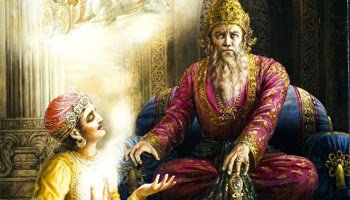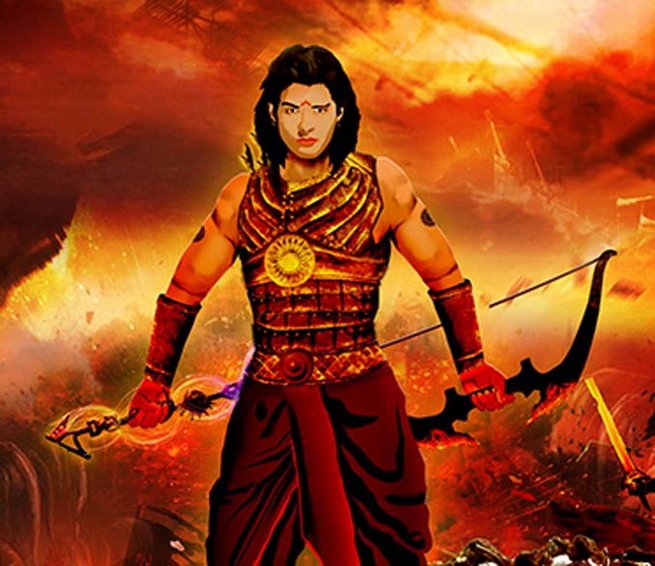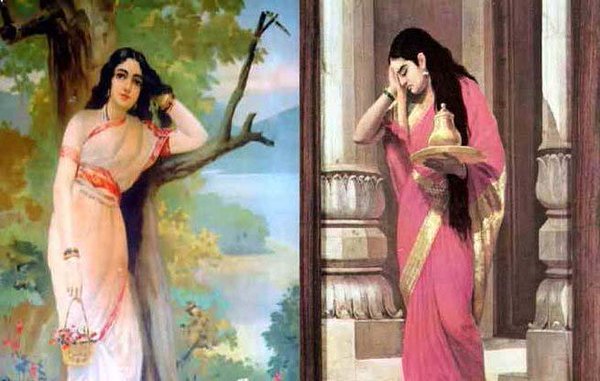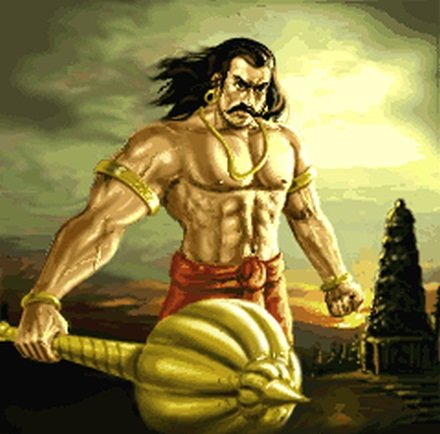We have a question from Vijay,
According to you, who is responsible for the Mahabharata war? I know there are multiple people who are responsible but what is the root cause of the war and who are the people responsible for it?
According to me, the root cause of the Mahabharata war is – disobedience of Dharma.
The subjects are so entangled in protecting their personal interests, that they forget what is their Dharma. This creates conflicts and sin, resulting in the intervention of God who has to come down, clean up the mess, protect the world and restore balance before it is destroyed forever.
Now who are these subjects responsible for Mahabharata war? Let’s see.
Dhritarashtra
#1 on our list is King Dhritarasthra.

Reasons are given below
- From the very outset, he wants the throne because he wants the power, prestige and legacy of “being a king”. He is the eldest Kaurav, he deserves to be the king. But since he is blind, he is deemed not suitable and his younger brother is made the king. This breeds jealousy in his mind – the first sign of weakness which itself proves he is not suitable to be the king.
- His intention is not to do the “Right” thing for his country, his intention is to do the “Right” thing for him. To him, his ambitions and accomplishments are more necessary than the welfare of his kingdom.
- Once he becomes the King after Pandu’s death, he had achieved what he wanted to achieve. But look, he is so selfish inside that he doesn’t want to do the “Right” thing thereafter, even though he has achieved his personal objectives. The “Right” thing for the kingdom is to elect that son who is worthy of the throne, not someone through Legacy. This is what King Bharat did by electing someone who is worthy of maintaining the kingdom, overshadowing his own sons. But Dhritarasthra didn’t do it, he was literally “blind” to make his own son the king, that he completely ignored this principle.
- He is always using Bheesma as a shield to protect himself and his selfish ambitions, whenever questions are raised as to why some decisions are taken. Bheesma has vowed to protect the king of Hastinapura and hence Bheesma is indirectly a slave of anyone who sits in that throne. Dhritarasthra knows it and exploits Bheesma as far as he can. Dhritarashtra knows that so long Bheesma is there, nobody can remove him from the throne, both politically and militarily. So I will keep doing whatever is right for me and my sons, not for the country.
- Dhritarasthra and only Dhritarasthra is the person who could have prevented the war. He is the king, the supreme authority. Had he followed the virtues of a king, he would have given 5 villages to Pandavas and made peace with them. There was no need of unnecessary bloodshed if giving 5 villages solves the problem. But No, he is blind for his wicked son Duryodhana, and he continues to protect all his interests, thereby killing millions of soldiers from both sides. Every single Widow of Hastinapura cursed Dhritarasthra as he is the one who is most responsible for the war. At a time of extreme conflict and chaos, the king has to take hard decisions and prevent civil war. But he does exactly the opposite, he keeps favoring his son and ignores everyone else.
- Last of all, there sits a blind father not a king. He is a hypocrite who watches the entire show, can stop it whenever he wants, but chooses not to because he wants to maintain himself and his son, at the cost of killing millions and obliterating the kingdom.
What could Dhritarasthra had done to prevent the war?
He should have first driven his wicked son away from the country. He should have sent Shakuni to Gandhar. He should have considered Pandavas as his own sons and correct where the problem is – fix Duryodhana’s jealousy. If the problem can’t be corrected, then that child has to be abandoned. If a country is saved by abandoning a wicked son, that is Dharma. But alas, he saw only him and his son and neglected the welfare of his kingdom.
Bheesma
#2 on our list is Bheesma.

The reason is same as I have mentioned for Dhritarasthra.
To Bheesma, maintaining his vow is more important than the welfare of his kingdom. He is another hypocrite who claims that he has made an oath to protect and serve the king of Hastinapura. But he forgets the basis of his own oath.
And what is the basis of his own oath of not marrying and protecting whoever becomes the king of Hastinapura? We will have to rewind a bit and go back to a conversation which happened in the court of Hastinapura when Bheesma had made the oath.
Rajguru: King Shantunu, can you please explain to this court why the place of the “Prince” is vacant?
Shantunu: I have given the promise to Satyavati and her father that her son will become the heir of Hastinapura’s throne. That is the reason why the place of “Prince” is vacant, since her son has not been conceived yet.
Rajguru: May I ask, who gave the King the right to swear this oath? The king does not own this land, its people. He is merely a representative. He has no right to take this decision. The logic is – the person who has not been born yet, who has not even been conceived, we do not know if he will be a worthy suitor of the throne. How can you make this decision? You do not have the right to play with the future of this country. We want to know what’s wrong with Prince Devavrata, that the king has decided to give his position to someone who has not even been conceived in his mother’s womb? If Devavrata has faults, then what merit did the King saw in that “Future” prince which made him to decide that the “Future” prince is a worthy suitor, compared to Devavrata?
Prime minister: Do the people have the right to ask this question to the King?
Rajguru: Yes, the people can ask any question to the King and the King has to answer. Please tell us O king, who gave you the right to replace a worthy prince Devavrata to someone who has not been conceived yet? If this creates chaos later and this land is destroyed, will you take responsibility?
Devavrata (Bheesma): May I say something to you? You cannot blame the king for the oath that I have made. I have taken the oath to remain a Brahmachari and not produce sons. That is my personal oath and I am free to take oaths since I am not answerable to anyone. You cannot blame the King because his son made an oath. The king had made his duty by telling father of queen Satyavati that Devavrata is the prince. It is me who decided to change the course and made my oath, that I will never sit on this throne and never produce children. It is me who has given this oath to the father of Satyavati that her elder son will rule the kingdom.
Rajguru: And who gave you the right to decide that Satyavati’s elder son has the worthiness of ruling this kingdom? We do not know whether he will be worthy of the throne or not. You do not have this right to decide whether a future son will be worthy or not. Why did you do this O devavrata?
Devavrata: I did this because if the king is unhappy, he cannot make his people happy. My father is unhappy and desires Satyavati and I did this for the welfare of my father and my kingdom.
Rajguru: And who will take this responsibility that the person who has not even been conceived yet, will not become an unworthy king? Will you take that responsibility?
Devavrata: I do take that responsibility. From now on, I pledge to protect the throne of Hastinapura and no matter who sits in this throne, I will take the responsibility to protect Hastinapura, no matter if that king is worthy or not.
This is the mistake that Bheesma made. This is when Bheesma broke Dharma.
To him, protecting his father’s interest is more than protecting the interest of the nation. He was the suitor of the throne but he reluctantly gave it away to someone who hasn’t been born yet, to ensure his father is happy. This is unacceptable since this is a violation of the code – you cannot appoint someone as a suitor of the throne who has not taken birth yet.
It doesn’t matter what oath you are taking. You cannot get in the way of the future of millions of people, just to arrange temporary happiness for your father.
What’s true for Dhritarasthra – Duryodhana is applicable here. In the former case, the King is blind for his son and in this case, the prince is blind for his father. Both the pairs are overlooking what is right for the country and want to ensure that their own son and own father are made happy.
Bheesma’s second fault is that he always wants to protect his own vow and has no real consideration for what is right for the country. When Duryodhana and Dhritarasthra are making wrong decisions, Bheesma’s Dharma was to forget his oath and forcefully remove Dhritarasthra from the Throne, put Duryodhana behind Bars and appoint Yudhisthira as the King. Bheesmah’s moral intention is to protect Hastinapura but he is the one who is indirectly killing it, by being a slave of the blind king Dhritarasthra.
To Bheesma, his own vow of protecting the king is of greater significance than the actual welfare of the country. He has to protect his vow at all costs, no matter what happens to the country.
Dhritarasthra is hypocrite #1, Bheesma is hypocrite #2.
Kunti
#3 on our list is Kunti.

To her, protecting her own reputation in society is more important than the welfare of her country and sons.
From the very beginning, Kunti knew that Karna is her eldest son whom she had conceived from Surya dev before marriage. Hence, legally, morally and by virtues, Karna deserves to the king of Hastinapura since he is 16 years older than Yudhisthira, has all the qualities of becoming a king and no less in terms of virtues and valor.
She knew it when all the boys were fairly young, because she had identified the Kavach and Kundal of Karna when he became Duryodhana’s friend.
When the conflict was growing and the internal relationships were starting to get bitter, she could have revealed that Karna is her eldest son. Karna is the only common link between Pandavas and Kauravas and this revelation would have stopped the war once and for all.
Yudhisthira won’t fight against his elder brother and Duryodhana won’t fight against his best friend. Both parties will make peace if this information is revealed that Karna is the eldest Kunti putra. Karna will become the king and all the brothers will listen to him without any conflict, because Karna has the power of command over both Duryodhana and Yudhisthira.
But she did not do it. All through the course of her life, she kept hiding the truth. To her, protecting what society thinks of her and how she is viewed is more important than the future of her kingdom, her sons, her daughter in law and everyone else. When Draupadi’s swayamvar was organized, if she had revealed that Karna was not Soot Putra and her eldest son, then Karna would have won Draupadi, the disrobing incident would never had happened and Karna would himself call all his brothers from Jungle and helped to make peace between Duryodhana and Yudhisthira.
Only Karna had that privilege to act as a mediator between Yudhisthira and Duryodhana but Kunti never provided the context and it never happened.
Kunti is hypocrite #3 for hiding a truth which costed millions of lives, she never gave her son what he deserved, she saw bitterness between brothers and kept quiet. It is because of Kunti, Yudhisthira had cursed the entire womanhood that no woman will be able to hide any truth going forward.
Karna
#4 on our list is Karna.

He is another character who has nothing to gain or lose from this conflict but to amplify his ego, after he defeats Arjuna in war. He takes Duryodhana as an ally because that will help him prove to the world that he is no less competent than Arjuna.
He also suffers from low self esteem. Other people’s opinion is of great significance to him and he always looks for certifications from other people – Bheesma, Drona and the Pandavas themselves.
When he knew that he is the eldest son of Kunti, he could have approached Duryodhana and stopped the war. That was his Dharma – to do the right thing for the welfare of human lives.
But he chosed to do the wrong thing so that he can meet his personal ambitions of defeating Arjuna in the war. He is hiding behind an alibi, that he has to re-pay Duryodhana’s debt of friendship. In reality, Karna is using Duryodhana as a platform to attain his own selfish objective – to support his ego and establish that he is a better archer than Arjuna.
If he knows that he is a great Archer, why look for external validations? Be content with what you have and go your own way, why get into a family conflict? Even after knowing that he belongs to the family, why are you not helping to stop the war but providing more fuel to it? Why, for the love of god, why you have no control over your ego and flawed ambitions? If Duryodhana is your best friend and you want to pay the debt to him, please do yourself and Duryodhana a favor and show him the right path – the path to peace, happiness, belonging, respect, mercy and consideration. Instead, you are showing him the path to kill others and get killed in the process, is that the real definition of friendship? You are not a real friend, you are just posing to the world that you are a friend. In reality, you are using Duryodhana to prove your point to the world, which anyway you could not achieve since you were on the wrong side of Dharma.
Karna and only Karna could have convinced Duryodhana to change tracks, because he was his best friend and Duryodhana only listened to him for advice. When he had the opportunity to do so, he choosed not to do it because then his personal ambition and ego would have taken a blow. So suppress the truth and let everyone die, let everyone get into the mud and fight a meaningless battle. Let my best friend die, it doesn’t matter – I have to protect my ego and ambition, that is more important.
Karna is hypocrite #4 for hiding a truth and not taking responsibility to make peace between the two parties, wherein he alone could have done that with no resistance from either parties.
Draupadi
Draupadi is hypocrite #5

To her, getting revenge of an insult is more important than the lives of her husbands, her sons, her brothers, her father, her kingdom and everyone else. Since she was molested and disrobed in the Kuru kingdom, she has to take revenge at all costs.
Yudhisthira, Arjuna, Nakula and Sahadeva want peace. Bheema is tied with his vow of killing Dushashana and Duryodhana, and now Draupadi uses this as another reason why rest of the Pandavas should not shy away from the battle. She repeatedly encourages everyone to go fight and bring her the blood of Dushashana’s chest and break Duryodhana’s thighs.
Krishna tells Draupadi before the battle
Yes we agree that you have been humiliated in the Kuru court. We agree whatever happened to you was not right. But that does not give you the right to put at stake the lives of millions of people. In this war, millions of men will die. Will Draupadi take responsibility of their families? Will Draupadi be able to answer the question of all the widows? Why should other men die because your husband put you at stake in some dice game and you were molested. When we are talking about the welfare of the entire kingdom and trying to save human lives, please do not show your insulted hair and always bring that same disrobing incident in question. Your husband, Bheema has pledged to kill Duryodhana and Dushashana. We know that. He can fulfill his vow and personal enmity later on by fighting a one on one duel with those subjects. There is no reason why other people have to die for his vow.
Draupadi disregards everything and is hell bent on not making peace with Kauravas. She has no pity for the men who will die fighting for her cause, this includes her own father, brother, sons and husbands. When Abhimanyu was killed, Subhadra had wept and told Draupadi that she was in some ways responsible for Abhimanyu’s death. The cause of “Revenge” becomes so strong, that she forgets the greater cause and lures millions of men into the battlefield, most of whom die for a meaningless reason.
She could have prevented the war by forgiving Duryodhana and making peace with her insult, but she chose not to.
Duryodhana
Duryodhana is #6 on this list and I will explain the reason why he is the last one.

What is Duryodhana’s fault? His only fault is he is arrogant, foolish and doesn’t know who is his well wisher and who is not his well wisher. The main players use him as a pawn and he allows them to use him as a pawn
All fingers are towards Duryodhana but realize that Duryodhana is only a pawn. He is a silly putty in the hands of Shakuni and Dhritarashtra. From his childhood days, his brain has been trained to develop animosity against his own cousins, the Pandavas.
Shakuni did it directly while his own father Dhritarashtra did it indirectly. We cannot blame him for the rage that he had in his heart, because that rage has been sown by others who want to achieve their own objectives by using Duryodhana as a pawn.
However, Duryodhana’s mistake is failing to realize who is his well wisher and who is not. He keeps listening to his uncle and father and believes that achieving the kingdom and killing Pandavas will give him happiness. In fact, nothing could have given him happiness because his mind is bitter with jealousy and rage, a mind which has jealousy inside will never find peace, contentment and sustainable happiness.
Everyone tried to make him understand. Krishna, Bheesma, Dronacharya, Kripacharya, Vidur, Gandhari, Kunti and even Yudhisthir. But he never listened to anyone and chosed to remain arrogant. He had humanitarian qualities and he was a great warrior, the only problem here is his arrogance and failure to recognize who is a well wisher and who is not.
Duryodhana is not interested in the welfare of his brothers, his men and his kingdom. His only intention is to defeat Pandavas and kill them. Which makes no sense at all.
Duryodhana is however, not a hypocrite. He is not a coward and he does not believe in cheating or breaking any rule. He never suppresses the truth and plays a fair game, no matter what happens. Duryodhana strictly adheres to his duties as a Kshatriya and even in his last combat, fights bravely. He chooses to face Bheema in combat over all the other Pandavas, whom he could have easily defeated in war. He molested Draupadi out of his vengeance and insult. This is never justified and it is his fault but we have to understand that he has been trained to think and do like that – by his uncle and father. He is an exploit, the real culprits being his father and uncle.
I have excluded Shakuni from this list because he is an outsider who took asylum in Hastinapura to destroy the entire Kaurava clan. If the king allows an outsider to enter the family and destroy his own son, then that outsider cannot be blamed. It is the fault of the king.
I have excluded Dronacharya and Kripacharya because they were an employee of Dhritarashtra and thus committed to serve the kingdom. Both were simply doing their duty as an employee and hence, cannot be blamed.
The Pandavas are excluded because they were fighting for their right and justice. They were on the side of Dharma.
Drupad and the kingdom of Panchala is excluded because they could have attacked Hastinapura alone when Pandavas were in Vanavas. But they did not. They always wanted to attack Hastinapura but they never did it, because Drupad was an authentic king. He waited and waited and waited for the right moment. When the right context came, he seized it and there is nothing wrong in it. His son killed Drona, avenging the insult and Drona killed Drupad, taking his vengeance.
Overall, if there is anyone who has to be blamed the most, it would be Dhritarashtra and Bheesma. Dhritarashtra is blind for his son and forgets the duty of a King and plays the duty of a father first. Bheesma is blind for his father and forgets the duty of a prince and plays the role of a son first.
Both of them are equally responsible and both point the finger towards the other, not realizing their own mistakes. If both characters corrected themselves first, the war could have been avoided.
